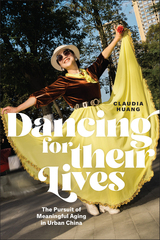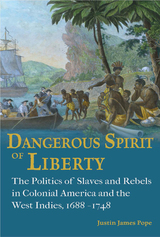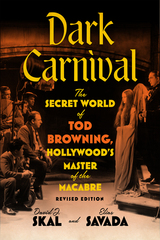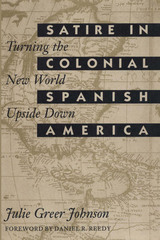
Satire, the use of criticism cloaked in wit, has been employed since classical times to challenge the established order of society. In colonial Spanish America during the sixteenth through the eighteenth centuries, many writers used satire to resist Spanish-imposed social and literary forms and find an authentic Latin American voice. This study explores the work of eight satirists of the colonial period and shows how their literary innovations had a formative influence on the development of the modern Latin American novel, essay, and autobiography.
The writers studied here include Sor Juana Inés de la Cruz, Juan del Valle y Caviedes, Cristóbal de Llerena, and Eugenio Espejo. Johnson chronicles how they used satire to challenge the "New World as Utopia" myth propagated by Spanish authorities and criticize the Catholic church for its role in fulfilling imperialistic designs. She also shows how their marginalized status as Creoles without the rights and privileges of their Spanish heritage made them effective satirists. From their writings, she asserts, emerges the first self-awareness and national consciousness of Spanish America.
By linking the two great periods of Latin American literarure—the colonial writers and the modern generation—Satire in Colonial Spanish America makes an important contribution to Latin American literature and culture studies. It will also be of interest to all literary scholars who study satire.
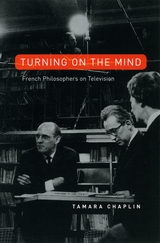
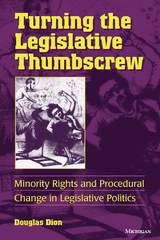
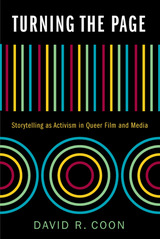
Surprisingly, Hollywood is still clumsily grappling with its representation of sexual minorities, and LGBTQ filmmakers struggle to find a place in the mainstream movie industry. However, organizations outside the mainstream are making a difference, helping to produce and distribute authentic stories that are both by and for LGBTQ people.
Turning the Page introduces readers to three nonprofit organizations that, in very different ways, have each positively transformed the queer media landscape. David R. Coon takes readers inside In the Life Media, whose groundbreaking documentaries on the LGBTQ experience aired for over twenty years on public television stations nationwide. Coon reveals the successes of POWER UP, a nonprofit production company dedicated to mentoring filmmakers who can turn queer stories into fully realized features and short films. Finally, he turns to Three Dollar Bill Cinema, an organization whose film festivals help queer media find an audience and whose filmmaking camps for LGBTQ youth are nurturing the next generation of queer cinema.
Combining a close analysis of specific films and video programs with extensive interviews of industry professionals, Turning the Page demonstrates how queer storytelling in visual media has the potential to empower individuals, strengthen communities, and motivate social justice activism.

One class, located in a private, racially integrated urban school, has had many conversations about the meaning of books. The second group, less advantaged students in a largely black urban school, has not. The reader watches as students in each group begin to draw upon experiences in their personal lives to speculate about events in the play. The students assist one another with the interpretation of complex passages, pose queries that help sustain the conversation, and struggle to "get Shakespeare right." Though the teachers suffer moments of intense frustration, they are rewarded by seeing their students learn to engage in meaningful exchange.
Because Turning the Soul draws on actual classroom conversations, it presents the range of difficulties that one encounters in interpretive discussion. The book describes the assumptions about learning that the use of such discussion in the classroom presupposes, and it offers a theoretical perspective from which to view the changes in both students and teachers.
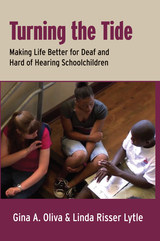
Turning the Tide presents a qualitative study of deaf and hard of hearing students who attended mainstream schools. The authors conducted three focus groups in different regions in the country, enlisting six to eight participants with diverse backgrounds for each session. They also gathered information from 113 online respondents who answered the same questions used in the focus groups. The respondents discussed many issues, including the difficulties of finding friends and social access, the struggle to establish an identity, the challenges of K-12 interpreting and class placement, and the vast potential of summer and weekend programs for deaf students. Their empowering stories clearly demonstrate that no deaf or hard of hearing student should be educated alone. The authors also elicited comments on other changes that parents, advocates, and other allies could work toward to improve further the educational environment of deaf children.

This new edition of Turning the Tide addresses new developments of the past decade and examines the factors that will have the most significant effects on the health of the Bay in the coming years.With new case studies and updated maps, charts, and graphs, the book builds on the analytical power of ten years of experience to offer a new perspective, along with clear, science-based recommendations for the future.
For all those who want to know not only how much must be done to save the Bay but what they can do and how they can make a difference, Turning the Tide is an essential source of information.
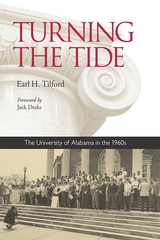
This book documents the period when a handful of University of Alabama student activists formed an alliance with President Frank A. Rose, his staff, and a small group of progressive-minded professors in order to transform the university during a time of social and political turmoil. Together they engaged in a struggle against Governor George Wallace and a state legislature that reflected the worst aspects of racism in a state where the passage of civil rights legislation in 1964 and 1965 did little to reduce segregation and much to inflame the fears and passions of many white Alabamians.
Earl H. Tilford details the origins of the student movement from within the Student Government Association, whose leaders included Ralph Knowles and future governor Don Siegelman, among others; the participation of key members of “The Machine,” the political faction made up of the powerful fraternities and sororities on campus; and the efforts of more radical non-Greek students like Jack Drake, Ed Still, and Sondra Nesmith. Tilford also details the political maneuverings that drove the cause of social change through multiple administrations at the university. Turning the Tide highlights the contributions of university presidents Frank A. Rose and David Mathews, as well as administrators like the dean of men John L. Blackburn, who supported the student leaders but also encouraged them to work within the system rather than against it.
Based on archival research, interviews with many of the principal participants, and the author’s personal experiences, Tilford’s Turning the Tide is a compelling portrait of a university in transition during the turbulence surrounding the civil rights and anti-war movements of the 1960s.
READERS
Browse our collection.
PUBLISHERS
See BiblioVault's publisher services.
STUDENT SERVICES
Files for college accessibility offices.
UChicago Accessibility Resources
home | accessibility | search | about | contact us
BiblioVault ® 2001 - 2025
The University of Chicago Press


